Student activities/Aktivity studentů
By Jakub Rafoth, Y1 Terra
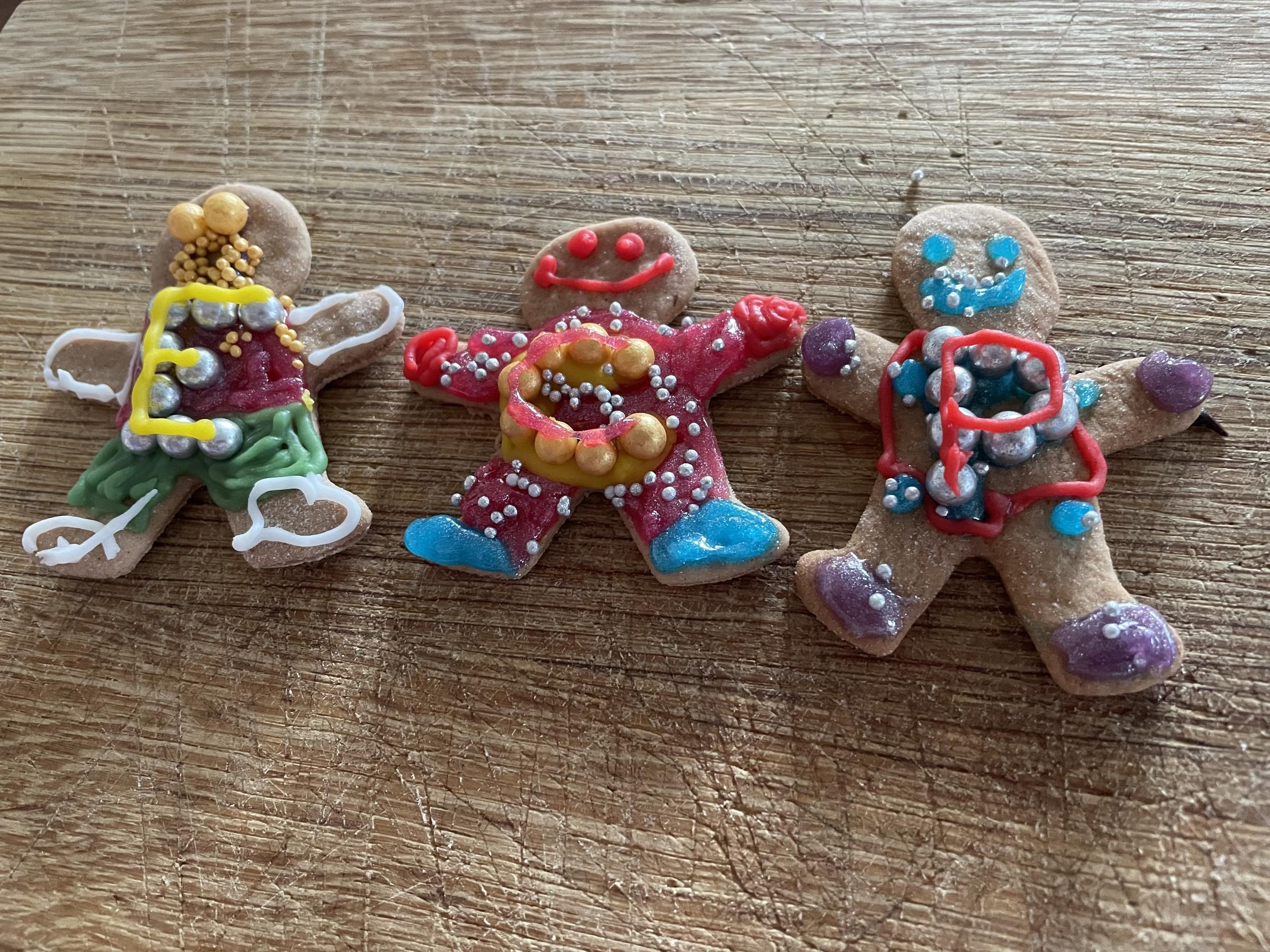
Student activities/Aktivity studentů
By Jakub Rafoth, Y1 Terra
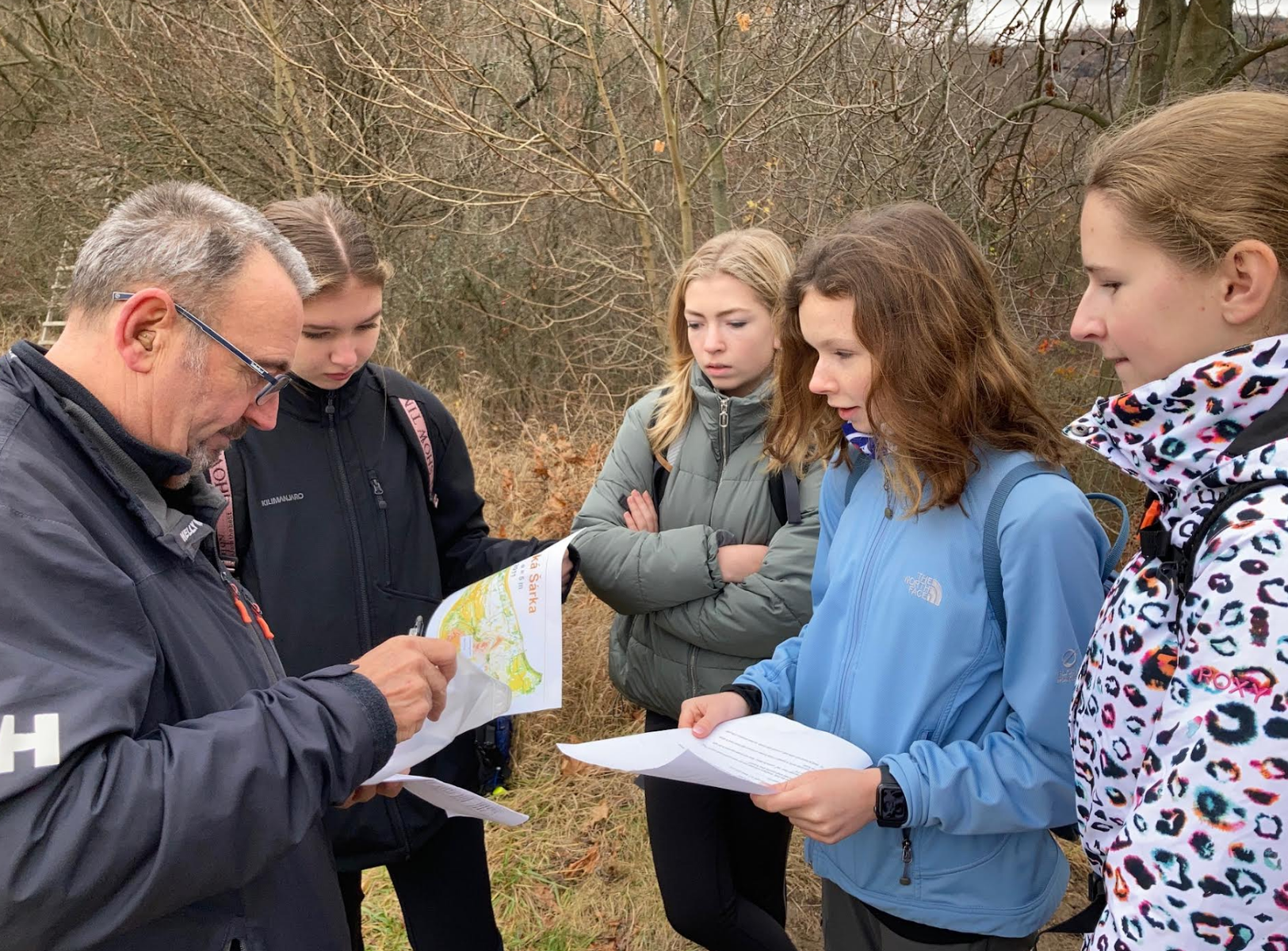

On 20th November, the DofE Bronze participants took part in a Navigation Exercise at the Divoká Šárka park. The students were given compasses and topographic maps and in groups of 2-5 they walked around the park for about 4km in search of seven locations using their newly acquired skills. Two boys decided to run and made the route in less than half an hour which was amazing, considering the hills they had to conquer. Nobody got lost so it all went well:)
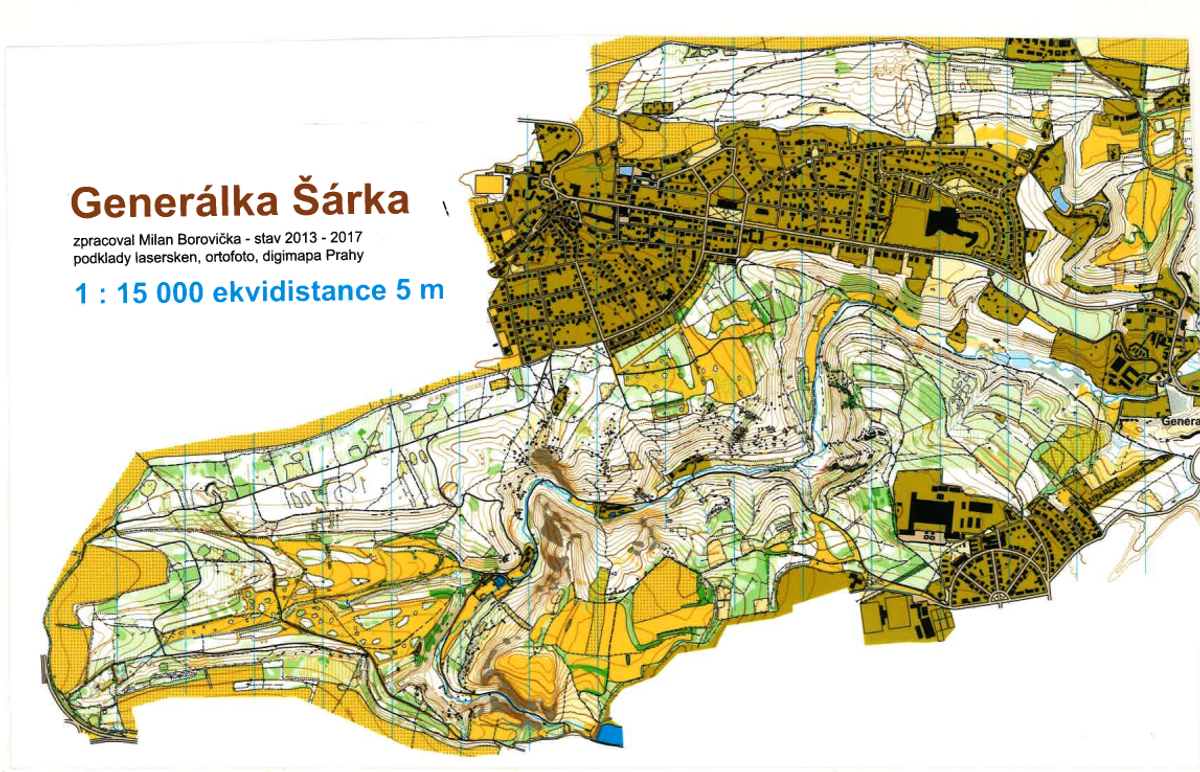

Účastníci bronzového programu DofE se 20. listopadu zúčastnili navigačního cvičení v lokalitě Divoká Šárka. Studenti dostali kompasy a topografické mapy a ve skupinách po 2-5 procházeli parkem zhruba 4 km a hledali sedm míst s využitím svých nově nabytých dovedností. Dva chlapci se rozhodli běžet a trasu zvládli za méně než půl hodiny, což bylo úžasné, vzhledem k velkému počtu kopců, které museli zdolat. Nikdo se neztratil, takže vše dobře dopadlo:)
During the half-term week, I had an opportunity to peek into the world of law thanks to the school’s work-experience programme. As an intern at the UEPA s.r.o. international law firm, I observed the company environment and further facilitated my choice of career. Working along with current university law students, I was given useful tips on both the academic and practical world of law. I took part in legal research assigned by the experienced lawyers to the students, and my English skills were put to use when drafting what was colloquially referred to as the “Covid newsletter” the firm puts together for its partners. The view into the environment of a legal company has filled me with enthusiasm about my future profession. The culture in the firm was extremely helpful and I thoroughly enjoyed being able to converse and learn from trainee lawyers. I would like to thank the firm for a warm welcome and the school and Mr Klett for facilitating this opportunity.
Ema Srnková, Y6
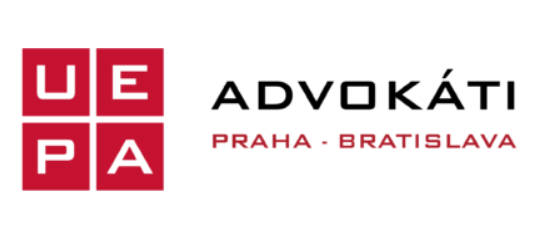

Během podzimních prázdnin jsem díky programu pracovních stáží, který škola zastřešuje, měla možnost nahlédnout do světa právníků. Jakožto stážistka v UEPA s.r.o. jsem se seznámila s prostředím mezinárodní právnické firmy a ve výsledku si potvrdila, že této profesi se chci v životě věnovat. Pracovala jsem ve skupině současných studentů práv, což bylo zábavné i poučné zároveň. Měla jsem příležitost pomáhat s rešeršemi, které studentům ve firmě zadávají zkušení právníci. Rovněž jsem využila své jazykové znalosti jak v angličtině, tak v češtině, při psaní takzvaného “covid newsletteru”, který firma připravuje pro obchodní partnery. Atmosféra právnické firmy i možnost učit se od koncipientů a komunikovat se studenty práv mě nadchly a natěšily na mou budoucí kariéru. Firemní kultura byla velmi nápomocná a velice jsem si užila příležitost komunikovat a učit se od studentů práv. Ráda bych poděkovala firmě za vřelé přivítání a škole a panu Klettovi za zprostředkování stáže.
Ema Srnková, Year 6
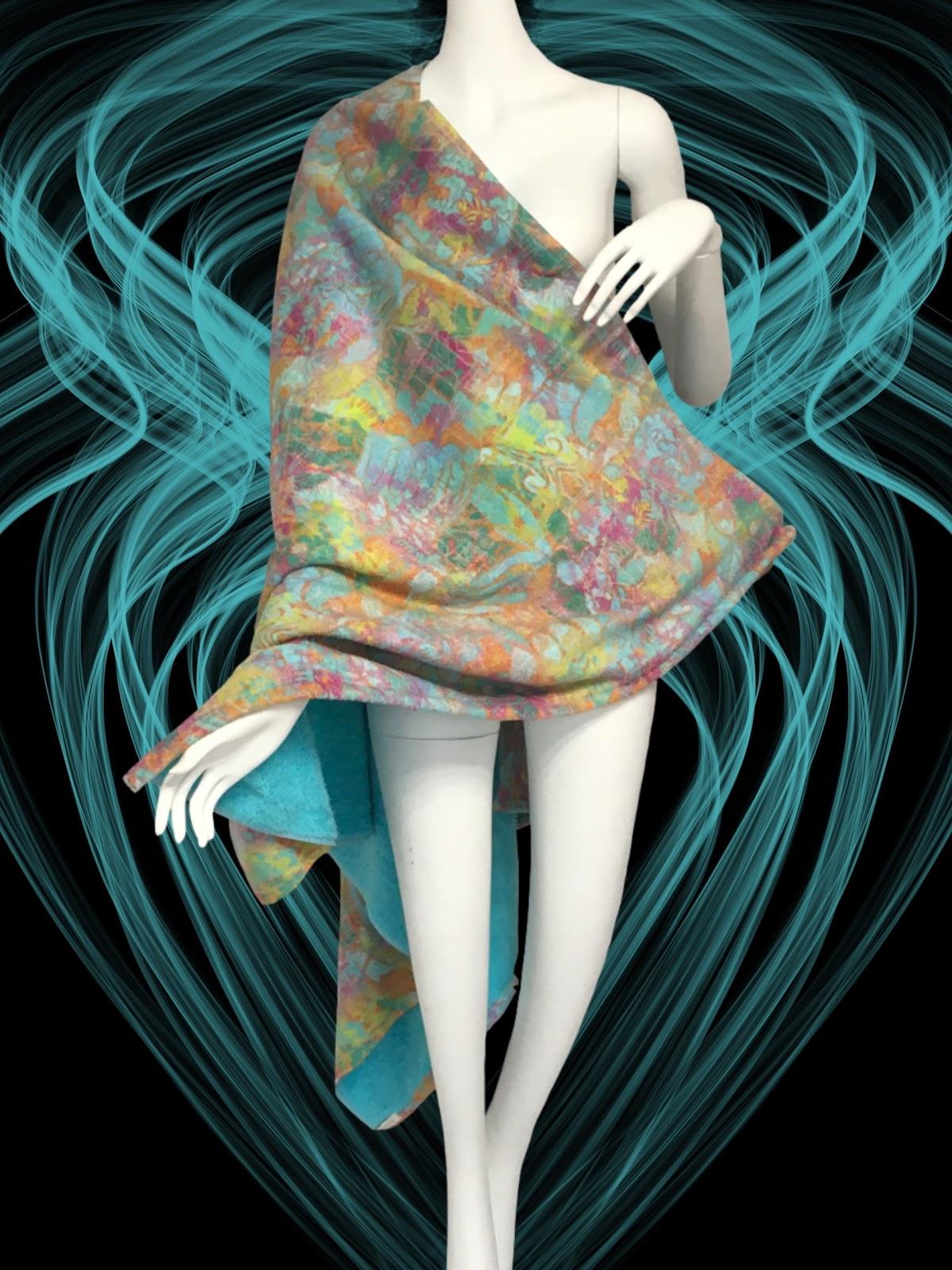

During the October Half-term holiday, I had the opportunity to attend an internship at the Jitka Klett Fashion Studio. My first day at the studio was rather introductory as I got to know what the brand is all about. We talked to Mrs Klett about what we do as students and what we are aiming for in the future as well as we learned what she does at the studio. After that, we had our first task and that was to come up with a phrase that would be used on Instagram. We, the ECP students, were not the only interns in the studio. We had the pleasure to meet Dorian, an intern from France, who was a huge help as he taught me how to work in Procreate (A programme on iPad for digital art).
Throughout the other days, I got more comfortable at the studio and worked on more tasks. Mrs Klett gave us feedback on the designs we did during the internship and shared her ideas with us on how to improve them. She gave us a lot of freedom to explore and develop as well as guided us throughout the design process.
Overall, the internship was a great experience. I was amazed at how much work and thought goes into designing dresses for a runway. I have great respect for the designers because of how much stress they go through and deliver such amazing pieces. It was a memorable experience that taught me a lot as well as enabled me to meet new great people.
Tomáš Vladyka
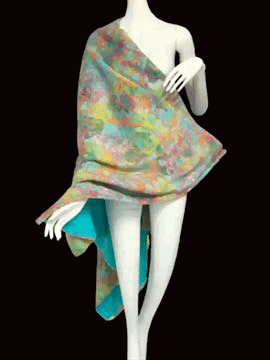

O říjnových prázdninách jsem měl možnost zúčastnit se stáže v módním studiu Jitka Klett. Můj první den ve studiu byl spíše seznamovací, abych poznal, o čem ta značka je. S paní Klett jsme si povídali o tom, co jako studenti děláme a co plánujeme do budoucna, a také jsme se dozvěděli, co dělá ve studiu. Poté jsme dostali náš první úkol a to vymyslet frázi, která by byla použita na Instagramu. My, studenti ECP, jsme nebyli jediní stážisté ve studiu. Měli jsme to potěšení potkat Doriana, stážistu z Francie, který mi velmi pomohl, protože mě naučil pracovat v Procreate (program na iPadu pro digitální umění).
Během následujících dnů jsem se ve studiu více zabydlel a pracoval na více úkolech. Paní Klett nám poskytla zpětnou vazbu k návrhům, které jsme během stáže vytvořili, a podělila se s námi o své nápady, jak je vylepšit. Dala nám spoustu svobody prozkoumávat a rozvíjet se a také nás vedla celým procesem navrhování.
Celkově byla pro mě tato stáž skvělou zkušeností. Byl jsem ohromen, kolik práce a přemýšlení je za navrhováním šatů pro přehlídku. Velmi si vážím návrhářů, protože podstupují hodně stres, aby předvedli tak úžasné kousky. Byla to nezapomenutelná zkušenost, která mě hodně naučila a zároveň mi umožnila poznat nové skvělé lidi.
Tomáš Vladyka
A new activity on the ECA scene this year, Squash is proving to be a bit of a hit (excuse the slight pun) amongst our younger students, most of whom are absolute beginners. And that's where we start: at the beginning. First and foremost are the basics - correct racquet grip and feet position - and once they are understood we move on to learning more about good stroke play. It's not about hitting the ball hard; it's direction, width, depth and height that are far more important in becoming an effective player. The coach, the evergreen Mr Pugh, spends a few minutes with each player every session, individually working on the key aspects for improvement. Meanwhile, the other ECA members take it in turn to play in pairs on the other court to practise these aspects of their games. Those not playing watch their peers, and try to learn from each other. They also have a chance to catch their breath…
The wonderful thing about squash is that, regardless of one's level, one is bound to have a good workout, getting the heart racing and the lungs pumping. One would think that such strenuous exercise would be well within the limits of our young ECP students, yet strangely it is they who stand around outside the court panting for breath, while 'Evergreen' just carries on without a break. Isn't that interesting?
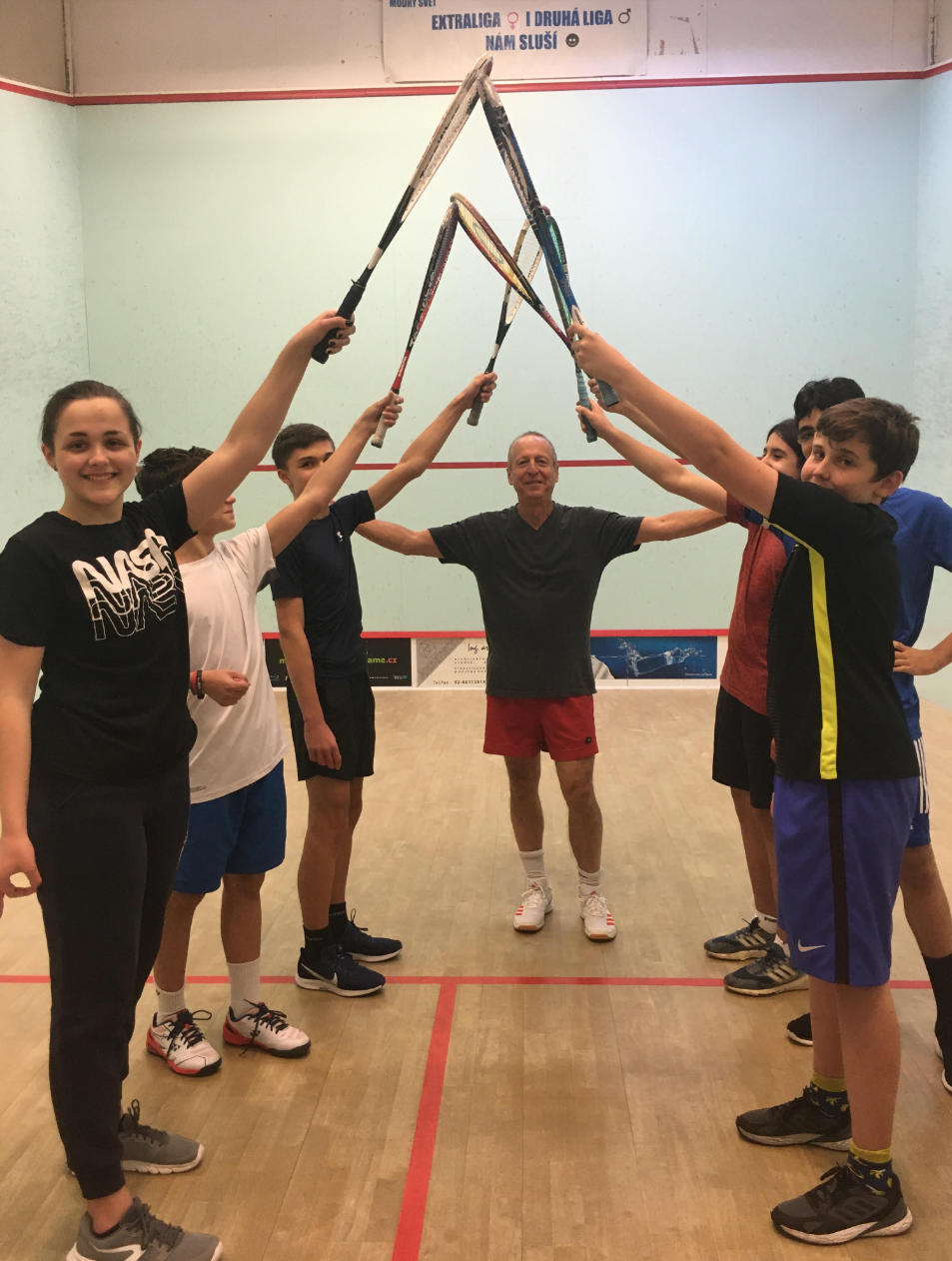

Squash je novou aktivitou, kterou v Anglickém gymnáziu nabízíme. Je to trefa (omluvte malou slovní hříčku) mezi našimi mladšími studenty, z nichž většina jsou v tomto sportu absolutními začátečníky. Nejdůležitější jsou na začátku základy - správný úchop rakety a pozice nohou – a jakmile je pochopíme, začneme se učit více o dobrých úderech. Není to o síle úderu, ale spíše o jeho směru, šířce, hloubce a výšce, které jsou mnohem důležitější pro to, abyste se stali stát se efektivním hráčem. Trenér, věčně energický pan Pugh, stráví při každém tréninku několik minut s každým hráčem a individuálně pracuje na klíčových aspektech pro jeho zlepšení. Mezitím ostatní členové tohoto kroužku střídavě hrají ve dvojicích na druhém hřišti, aby si svou hru procvičili. Ti, kteří nehrají, sledují své vrstevníky a snaží se jeden od druhého něco naučit. Přitom mají také šanci popadnout dech.
Na squashi je úžasné, že bez ohledu na úroveň kvality hry má každý hráč dobrý trénink, srdce se mu rozbuší a plíce se rozpumpují. Člověk by si myslel, že takové namáhavé cvičení by mělo být pro naše mladé studenty ECP bez problémů, ale kupodivu jsou to právě oni, kdo stojí venku před kurtem a lapají po dechu, zatímco věčně energický pan Pugh prostě pokračuje bez přestávky. Zajímavé, že?
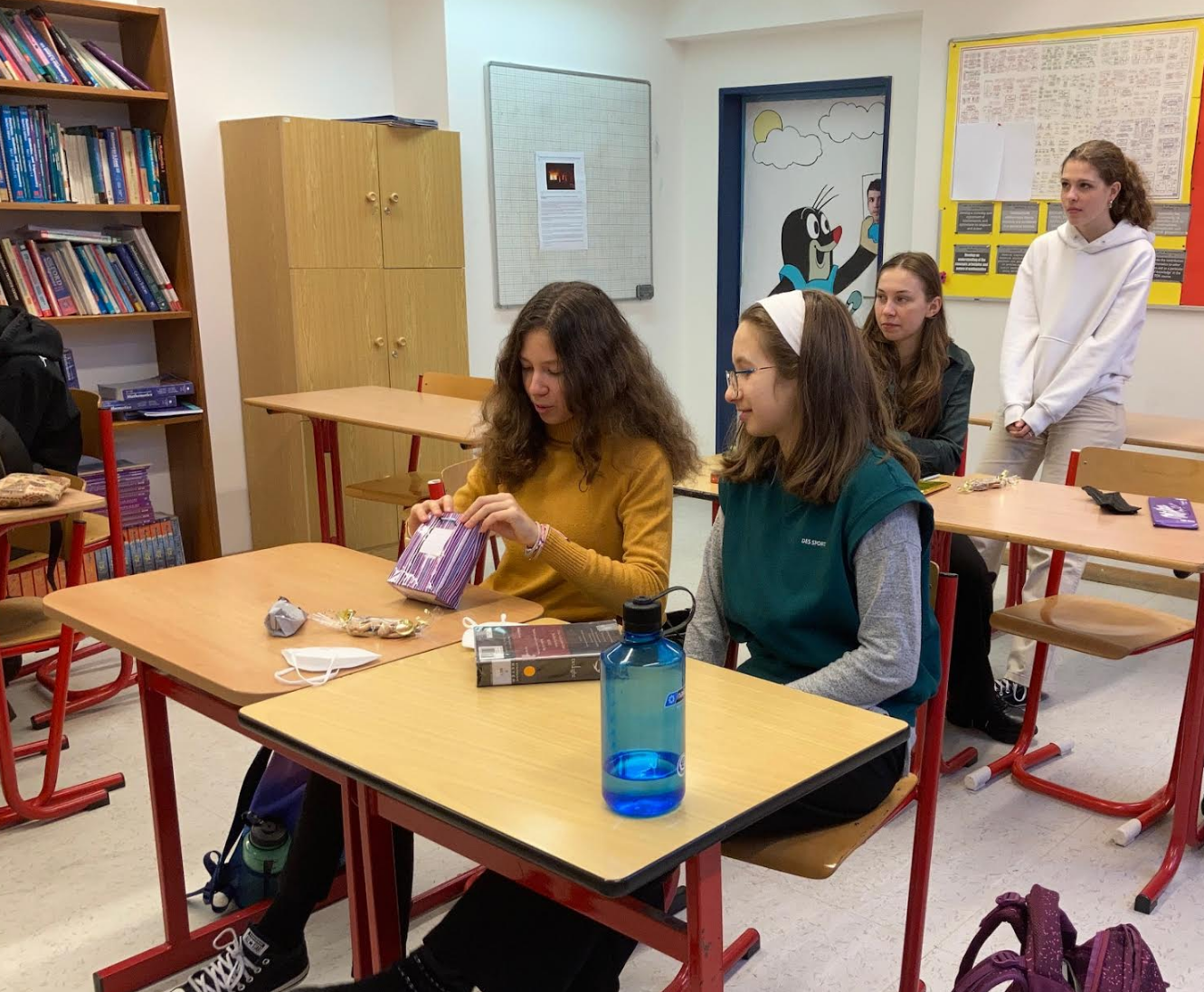

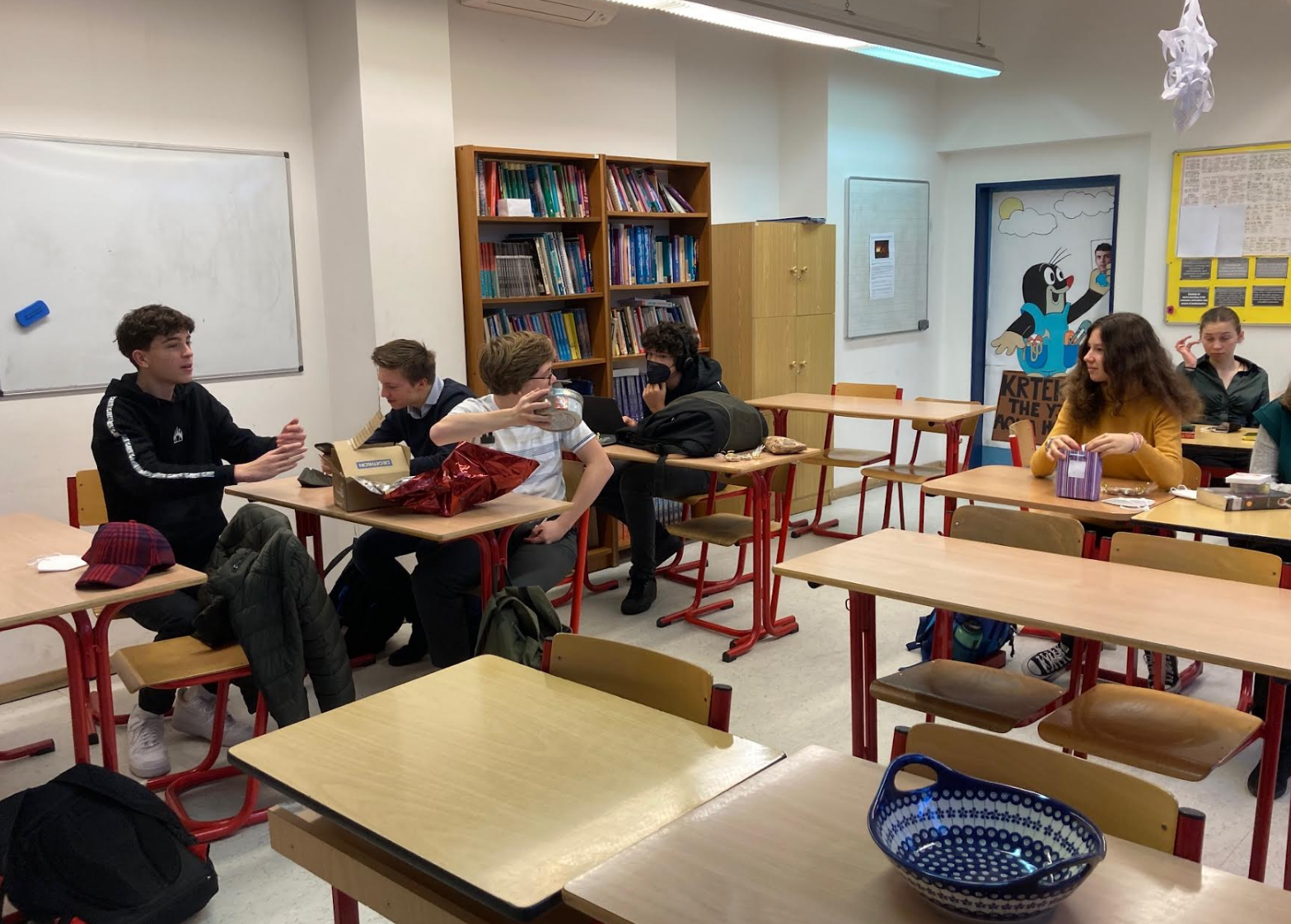

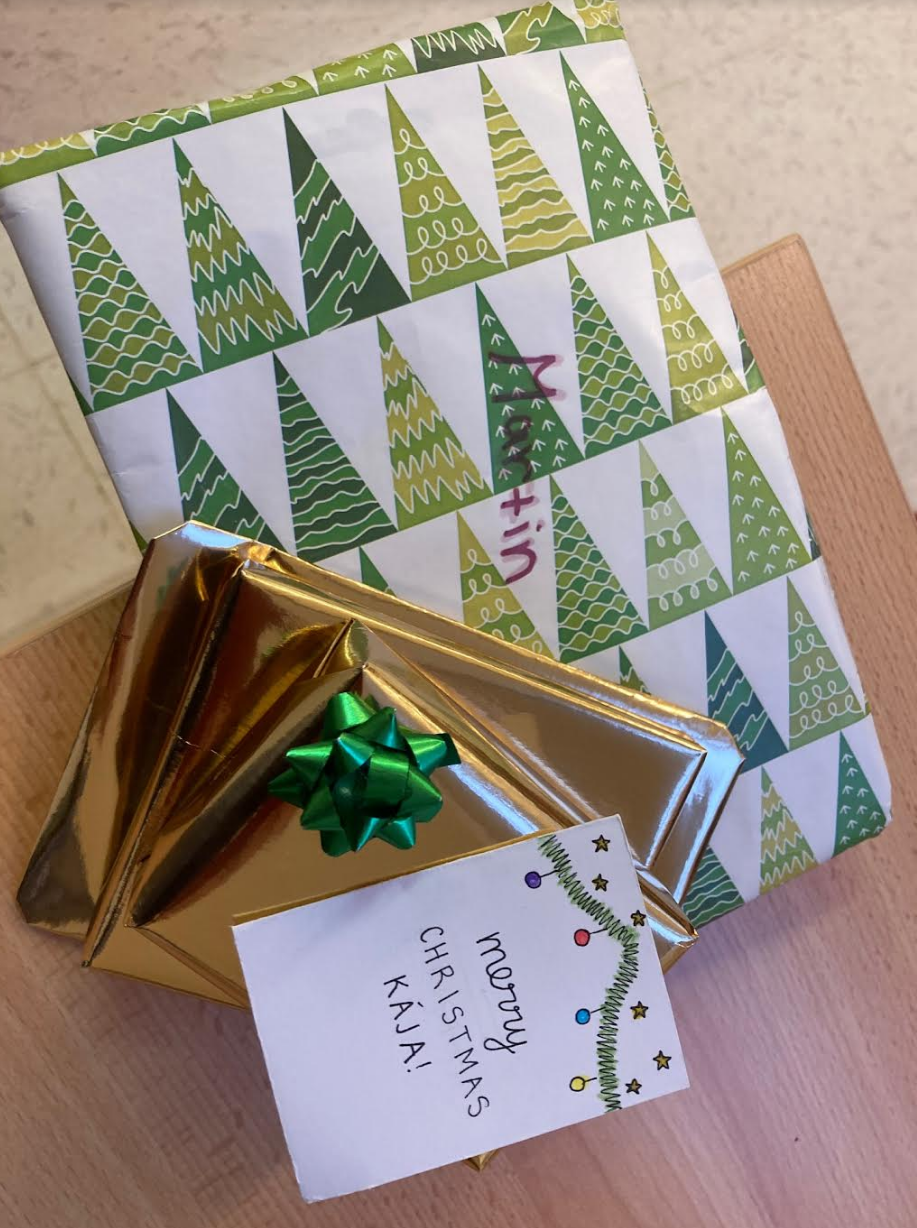

International Students’ Day/Mezinárodní den studentstva
International Students' Day, taking place on November 17th, is a global celebration of student action. This date commemorates the Nazi storming of the University of Prague (1939), which resulted in the execution of 9 student leaders, the deportation of over 1200 students to concentration camps, and the closure of all Czech universities following demonstrations against the murder of Jan Opletal as well as the occupation of Czechoslovakia.
In 1989, to commemorate International Students Day independent student leaders along with the Socialist Union of Youth (SSM/SZM) organised a mass demonstration, with about 15 000 people taking part. This 50th Anniversary gave all students an opportunity to voice their disagreements with the Czechoslovakian communist party, or at least that is what it was supposed to be like. What started off as a peaceful protest ended up with many of the participants violently assaulted by riot police, red barrettes, and other law enforcement officers.
This was a day that was supposed to let students in Czechoslovakia voice their displeasure in a peaceful manner. However, during the communist rule this was already quite risky, considering it was about people going against the Communist party and voicing their "negative" opinions towards them. But overall, it was still initially a peaceful protest that was wrongly and unfairly handled.
Every year, on this day, all of us should take some time out of our day to remember these victims of such unfairness and thank them for what their speaking up did for us and our country. It also teaches us about how important it is to speak up for what we believe in and never to think that even a single action doesn't matter, because this day is the proof of the opposite. People stood up and helped bring the downfall of the Czechoslovakian communist regime and that is why I am now allowed to write this here today.
Emma Chovancová
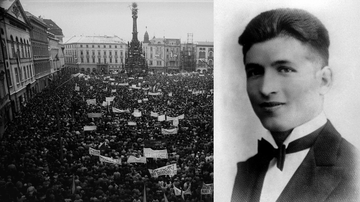

Mezinárodní den studentstva, který si připomínáme 17. listopadu, je celosvětovou oslavou studentských aktivit. Toto datum připomíná nacistický útok na pražskou univerzitu (1939), který měl za následek popravu 9 studentských vůdců, deportaci více než 1200 studentů do koncentračních táborů a uzavření všech českých vysokých škol kvůli demonstracím proti vraždě Jana Opletala a okupaci Československa.
V roce 1989, na památku Mezinárodního dne studentstva, zorganizovali nezávislí studenti spolu se Socialistickým svazem mládeže (SSM/SZM) masovou demonstraci, které se zúčastnilo asi 15,000 lidí. Toto 50. výročí dalo všem studentům příležitost vyjádřit svůj nesouhlas s Československou komunistickou stranou, nebo to tak alespoň mělo být. To, co začalo jako pokojný protest, skončilo tím, že mnoho účastníků bylo násilně napadeno pořádkovou policií, červenými barety a dalšími policisty.
Byl to den, který měl umožnit studentům v Československu vyjádřit svou nelibost pokojným způsobem. To ale bylo samo o sobě za komunistické vlády dost riskantní, protože lidé protestovali proti komunistické straně a vyjadřovali své „negativní“ názory. Celkově to však byl zpočátku pokojný protest a reakce na něj byla nesprávná a nespravedlivá.
Každý rok, v tento den, bychom si všichni měli udělat čas, abychom si připomněli tyto oběti takové nespravedlnosti a poděkovali jim za to, co jejich odvaha protestovat udělala pro nás a naši zemi. Ponaučením pro nás také je, jak je důležité hlásit se k tomu, v co věříme, a nikdy si nemyslet, že jeden osamocený čin není důležitý, protože 17. listopad je toho důkazem. Lidé povstali a tím pomohli vyvolat pád československého komunistického režimu, a proto nyní mohu o tomto tématu psát.
Emma Chovancová
Protests Sparking the Velvet Revolution/ Protesty předcházející Sametové revoluci
On the 28th of October, 1939, Czech students took to the streets to demonstrate against the Nazi occupation. The protest was ruthlessly suppressed, by the Germans who fired at random into the crowd. One of the student leaders, Jan Opletal, got serious bullet wounds and later died from them. Thousands went to his funeral. After the protest, Hitler authorised the execution of nine students, and around 1,200 others were sent to labour and concentration camps. My great-grandfather went to the protest and was one of the 1,200 people who were sent to concentration camps. Hitler authorised the execution without trial of protest leaders and made it a policy to fire into even small gatherings. Hitler also promised to "flatten" Prague if there were any further demonstrations against the Nazis.
After the war, the communists took over Czechoslovakia and were there until the Velvet Revolution, which took place on the 50th anniversary of the demonstrations - in 1989. It was the beginning of the end of communist rule. My father was twenty at that time, and my mother was sixteen. My father took part in the protest against the communist regime. The police started chasing after the students, and my father, along with about fifty other students, ran to a nearby apartment building where a man let them take cover in his flat. They had to be absolutely silent because the man helping them could have gotten arrested for it. Then one by one they snuck out and headed back home. The protests of the students sparked courage in everyone and people who were too afraid to speak up before, suddenly felt like they had the power and right to do so. Posters and news was spread among people and within a fortnight, Czechoslovakia was free from the communist regime.
I think that the students' role in protesting against what they thought was wrong was very significant. It inspired others around them and showed that educated young people could stand up to what is wrong and voice their opinion. These events are very important to Czech history because without them we would be in a very different place right now. We can learn from our past and see what was wrong and right, what to repeat and what not to do. That’s why history is vital, it helps us learn from our mistakes and the mistakes of others. Czechoslovakia was under a communist regime for a long time but in the end was able to overcome it and overpower it.
Margit Pertoldová
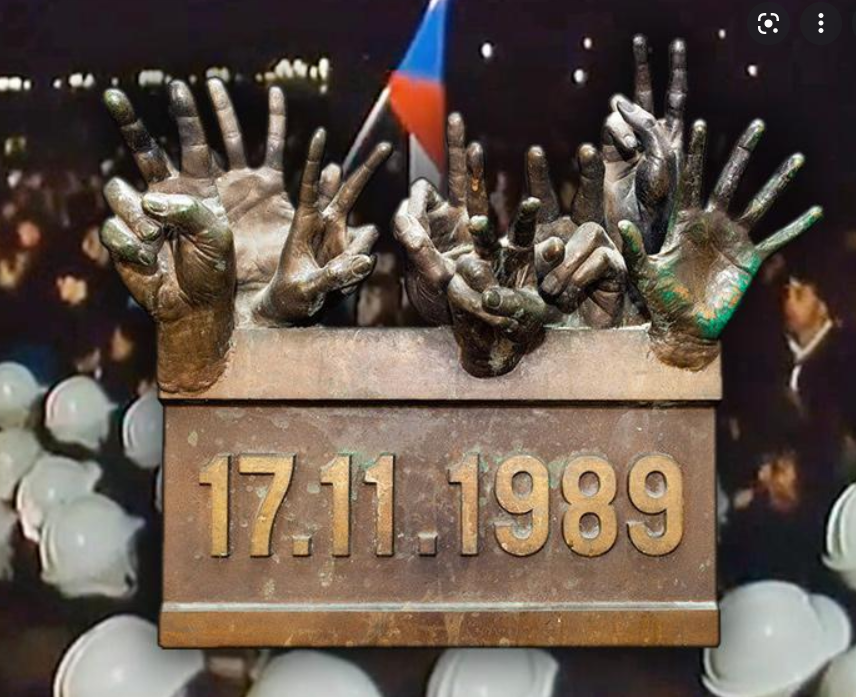

28. října 1939 vyšli čeští studenti do ulic demonstrovat proti nacistické okupaci. Protest byl nemilosrdně potlačen Němci, kteří náhodně stříleli do davu. Jeden ze studentských vůdců, Jan Opletal, utrpěl vážná střelná zranění a později na ně zemřel. Na jeho pohřeb přišly tisíce lidí. Po protestu Hitler povolil popravu devíti studentů a asi 1,200 dalších bylo posláno do pracovních a koncentračních táborů. Můj pradědeček šel na protest a byl jedním z 1,200 lidí, kteří byli posláni do koncentračních táborů. Hitler povolil popravu vůdců protestů bez soudu a zavedl politiku střílet i do malých shromáždění. Hitler také slíbil „srovnat“ Prahu, pokud by došlo k dalším demonstracím proti nacistům.
Po válce komunisté ovládli Československo a byli u moci až do sametové revoluce, která proběhla k 50. výročí studentských demonstrací - v roce 1989. Byl to začátek konce komunistické vlády. Mému otci bylo v té době dvacet a matce šestnáct. Můj otec se zúčastnil protestu proti komunistickému režimu. Policie začala studenty pronásledovat a můj otec spolu s asi padesáti dalšími studenty utekl do nedalekého činžovního domu, kde je nějaký muž nechal ukrýt ve svém bytě. Museli být absolutně zticha, protože muž, který jim pomáhal, by za to mohl být zatčen. Pak se jeden po druhém vykradli a vydali se zpátky domů. Protesty studentů zažehly odvahu ve všech a lidé, kteří se předtím příliš báli promluvit, najednou cítili, že na to mají moc a právo. Mezi lidmi se šířily plakáty a zprávy a do čtrnácti dnů bylo Československo osvobozeno od komunistického režimu.
Domnívám se, že role studentů v protestu proti tomu, co považovali za špatné, byla velmi významná. Inspirovali ostatní kolem sebe a ukázali, že vzdělaní mladí lidé se dokážou postavit tomu, co je špatné, a vyjádřit svůj názor. Tyto události jsou pro české dějiny velmi důležité, protože bez nich bychom teď byli úplně jinde. Můžeme se poučit ze své minulosti a vidět, co bylo špatné a správné, co opakovat a co už ne. Proto je historie životně důležitá, pomáhá nám učit se z chyb našich i chyb druhých. Československo bylo dlouhou dobu pod komunistickým režimem, ale nakonec jej dokázalo překonat a přemoci.
Margit Pertoldová
Remembering Jan Opletal/Vzpomínka na Jana Opletala
In this article it details the events that occurred on the 28th of October and 17th of November 1939. On the 28th of October (Czechoslovak independence day) a peaceful student protest was violently suppressed and resulted in many students being injured / killed due to soldiers shooting into the crowd. The situation was made worse when, on November 17th 1939, the most influential students involved in the protest were executed and thousands of students that participated in the protest were sent to concentration camps.
I really took an eye to this article as it resonates with me, as a student. The people brutally killed were not that much older than I am which helps me understand how tragic it was that their lives were cut so short. Furthermore the large scale of the expulsion of students from their homes to concentration camps shocked me, as I can not even comprehend how the students would have felt about being forced to leave their homes to be forced to work in a concentration camp. Personally I would not be able to cope with the doom of being forced to go to a concentration camp.
After reading the article I've begun to appreciate how fortunate I am to be living in a democratic country which allows freedom of speech / expression. Students at the time in Czechoslovakia must have been in constant fear of the repercussions for voicing their opinions and not being in that situation now shows how well off we are in 2021.
In conclusion the horror of the events of the 28th of October and 17th November 1939 shocked me and due to the students being in a similar situation to me academically I could really empathise with the students and their tragic situation.
Adam Koertzen
Tento článek podrobně popisuje události, ke kterým došlo ve dnech 28. října a 17. listopadu 1939. Dne 28. října (dnes Den vzniku samostatného československého státu) byl pokojný studentský protest násilně potlačen a měl za následek zranění/zabití mnoha studentů kvůli střelbě vojáků do davu. Situace se ještě zhoršila, když 17. listopadu 1939 byli nejvlivnější studenti zapojení do protestu popraveni a tisíce studentů, kteří se protestu zúčastnily, byly poslány do koncentračních táborů.
Téma článku mě velmi zaujalo, protože s ním jako student souzním. Mladí lidé, kteří byli brutálně zabiti, nebyli o tolik starší než já, což mi pomáhá pochopit, jak tragické bylo, že jejich životy byly tak krátké. Dále mě šokovalo vyhnání mnoha studentů z jejich domovů do koncentračních táborů, protože ani nedokážu pochopit, jak se studenti museli cítit, když byli nuceni opustit své domovy a museli pracovat v koncentračním táboře. Osobně bych asi osud nuceného odchodu do koncentračního tábora nezvládl.
Po přečtení článku jsem si začal uvědomovat, jaké mám štěstí, že žiji v demokratické zemi, která umožňuje svobodu slova / projevu. Tehdejší studenti v Československu museli mít neustálý strach z následků toho, že vyjádřili svůj názor, a skutečnost, že nyní v takové situaci nejsme, ukazuje, jak se máme v roce 2021 dobře.
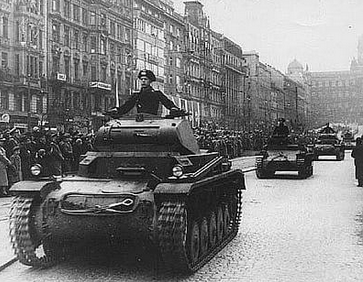

Celkově mě hrůzné události z 28. října a 17. listopadu 1939 šokovaly a vzhledem k tomu, že studenti na tom byli akademicky podobně jako já, mohu se s nimi ztotožnit a vcítit se do jejich tragické situace.
Adam Koertzen